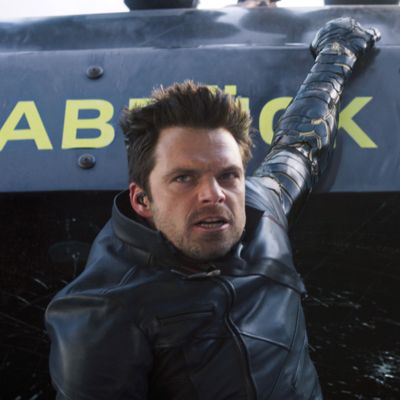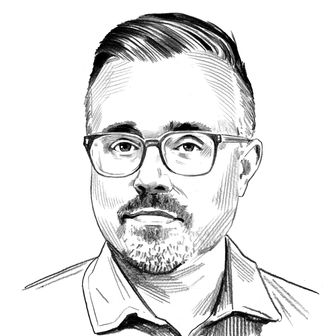
The longest episode yet of The Falcon and the Winter Soldier thrusts viewers into the second half of a story that’s now clearly about what exactly it means to be a hero in 2021. One of the most morally complex productions yet for the MCU, this episode might even go so far as to prove that the world is too complicated for Captain America. One person’s hero is another’s villain; one group’s terrorist is another group’s revolutionary. And what might ring the truest of the many insights about heroism in this episode is something that Zemo says: “Desire to become a superhuman cannot be separated from supremacist ideals.”
“The Whole World is Watching” opens in Wakanda in the final days of Bucky’s deprogramming. One of the best post-credit tags in the MCU was the reveal at the end of Black Panther that Shuri was working to help bring Bucky back to the world again, but this details how Ayo helped too, testing the Winter Soldier’s code words that once triggered him like the Manchurian Candidate. She was one of the ones to help free Barnes and now she’s asking how Bucky could have freed Zemo. Everything is a cycle. She gives Bucky eight hours to use Zemo before they come for him. There are a few well-implemented ticking clocks in this episode, including Ayo and the Dora Milaje coming for Zemo and John Walker coming for Karli. No one has any patience in the MCU.
Karli’s profile as an international villain has grown exponentially after bombing a GRC supply location, killing three. Zemo gets some nice monologuing here, including a great line that actually tugs on the thread connecting Nazis to Ultron to The Avengers. There’s also an interesting truth here in the belief that there has never been another Steve Rogers; no one else is good enough to be Captain America. While it may be for different reasons than Zemo’s theory that all superheroes are supremacists, the truth is that Sam and Bucky have both felt before that they’re incapable of picking up the shield. And John Walker will learn he certainly wasn’t good enough for it before his arc is done.
While the bombing is bringing more attention to the cause of the Flag Smashers, it’s also leading to stricter border control. Sam, Bucky, and Zemo need to find Karli and her super serums before someone else does. They get to Riga, where the funeral for Donya Madani is going to be held this afternoon. Sam wants a little assistance and so calls in Sharon to be his eyes in the sky. He learns that the Power Broker is mad, and he really wants his serum back, but Karli and one of her buddies are hiding it in a cemetery. There’s a bit more discussion about how heroism has changed, including the insight that heroes don’t have the luxury of keeping their hands clean anymore. The most famous hero in the world is about to make that clear at the end of this episode.
Walker and Hoskins catch up with this show’s Three Musketeers, and it’s almost immediately confrontational. There will be a lot of discussion about the arc of John Walker, aka U.S. Agent, in this season, but what’s been interesting to watch is how Wyatt Russell is playing the impact of expectations. His take on Walker isn’t just an alpha male who takes heroism too far. There’s an undercurrent of desperation in his performance as a man who probably knows he’s incapable of following in Steve Rogers’s footsteps. He’s very good.
That desperation comes through in his restlessness around Karli. Sam wants to be a diplomat, someone who can talk Karli out of her terrorist plans, while Walker wants to use force. The new Cap gives Sam a little bit of time to work his charismatic magic. Karli would call it his hopeless optimism. While Sam is talking to Karli, and seems to be making ground, Walker is getting restless. Sam tells Karli she’s a supremacist, echoing what Zemo said earlier, but he seems to be connecting. And then Walker ruins it all. He spooks Karli, who runs, and then they lose her. Suddenly, Zemo has found her, and he’s shooting. There’s super serum everywhere. He injures Karli, but he gets distracted by the serum vials on the floor, destroying them as Karli escapes. Walker bursts in, knocks out Zemo, and spots one remaining vial of super juice. Uh oh.
After a bit of dialogue about how Karli wants to kill Cap and whether or not Lemar would have taken the serum, a show that’s been a little light on actual action lately gets a big fight scene. Ayo takes Bucky’s arm off! Spears and shields are thrown. Sebastian Stan really sells the fight choreography as well as anyone in the MCU right now, while Falcon’s specific skill set is used a little differently. Throw in the Walker/Hoskins dynamic and the Dora Milaje and the Flag Smashers and you have an episode with a nice variety of action. In the chaos, Zemo “pulled an El Chapo,” escaping through the sewers.
Walker and Hoskins are talking just before the cruel end of this episode and Lemar asks a crucial question: “Power just makes a person more themselves, right?” Does it? Are villains made more evil by power and heroes made more heroic? Then what is John Walker? And does power amplify weakness as much as strength, even in heroes?
The final fight sequence of the episode reveals that Walker took the serum and Hoskins may end up wishing that he did. Is it that easy? Did John put it in his coffee? Fewer side effects than the Moderna vaccine? Anyway, he’s kicking dudes down flights of stairs and bending pipes. They almost get Walker when Hoskins jumps in to save the day and gets thrown across the room, landing in a heap, appearing dead.
Let’s back up a second here. The Falcon and the Winter Soldier has gotten some praise for dealing with complex racial issues with characters like Isaiah Bradley and Sarah Wilson, but there’s also been concern that these people aren’t being fleshed out enough, merely used for talking points. Did they just fridge Battlestar? Did they kill a Black character to give a push to a white one’s arc? Not great. And Sarah once again this week became a device on the other end of the phone. Let’s see how this plays out next week. Maybe Hoskins isn’t dead and can feel like more of a character of his own in the final two episodes.
Before then, John Walker sees nothing but red. He jumps through a window, grabs Karli’s buddy from the cemetery, and beats him to death with a symbol of heroism recognized around the world in a public square. Everyone sees it, including Karli. They all have their phones out. And Captain America’s shield is covered in blood.
Easter Eggs Assemble
• This is totally a stretch, but every MCU product makes people more flexible. When Zemo mentions Cherry Blossom tea, it feels like a reference, right? Could it be a coincidence that there’s a Marvel character named Cherry Blossom? She was on an all-woman strike force, not unlike the Dora, that worked for the Hand, known as the Nail in the world of Daredevil. Likely not a connection, but MCU fans have made wilder ones.
• The conversation between Lemar and Walker before the end of the episode feels almost like an easter egg to one that Erskine has with Rogers in Captain America: The First Avenger, wherein the good doc says that with the serum “bad becomes worse, good becomes great.”
• This episode was the lightest on easter eggs in the history of WandaVision or this program, which kind of felt nice, right? They don’t all need to require a thesis in Marvel Comics to connect.


